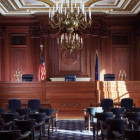
Juvenile Offenders that Work Long Hours and Skip School More Likely to Engage in Antisocial Behavior
|
A new study published in the journal Child Development finds that adolescents that eschew school for employment are more likely to be associated with antisocial behaviors than peers that either work less hours or focus solely on schooling. Researchers, over a five year window, examined the relationship between work hours and school attendance in a sample of almost 1,300 juvenile offenders. The study, conducted by researchers from Temple University, the University of Pittsburgh and the University of California, Irvine states that teens that work long hours while simultaneously attending high school classes were more likely to engage in antisocial behavior than classmates that had less work hours or did not work at all. In particular, researchers noted an apparent connection between high-intensity employment - categorized as more than 20 hours per week—and greater likelihoods of teens fostering antisocial behavior, such as bullying and vandalism. Teens that attended school regularly, without working, were found to demonstrate the least amount of antisocial behavior, while teens that worked long hours and did not attend classes regularly were found to be the likeliest adolescents to engage in antisocial activities.
